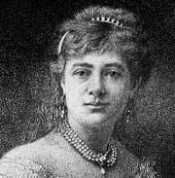Adam Juliette

Juliette Adam (4 October 1836, Verberie (Oise) – 23 August 1936, Callian (Var), also known by her maiden name Juliette Lambert, was a French author and feminist. Juliette Adam gave an account of her childhood, rendered unhappy by the dissensions of her parents, in Le roman de mon enfance et de ma jeunesse (Eng. trans., London and New York, 1902). Her father is described in Paradoxes d'un docteur allemand (published 1860), which shows him to have been sympathetic to feminism. In 1852 she married a doctor named La Messine, and published in 1858 her Idées antiproudhoniennes sur l'amour, la femme et le mariage, in defense of Daniel Stern (pen name of Marie d'Agoult) and George Sand. After her first husband's death in 1867, she married Antoine Edmond Adam (1816–1877), prefect of police in 1870, who subsequently became life-senator. She established a salon which was frequented by Gambetta and the other republican leaders against the conservative reaction of the 'seventies. In the same interest, she founded the Nouvelle Revue in 1879, which she edited for eight years, and retained influence its administration until 1899. She published writings by Paul Bourget, Pierre Loti, and Guy de Maupassant as well as Octave Mirbeau's novel Le Calvaire. She wrote notes on foreign politics, and was unremitting in her attacks on Bismarck and in her advocacy of the policy of revanche (revenge). She also became close friends with Yuliana Glinka, who was devoted to theosophy and the occult. Adam is generally credited with the authorship of papers on various European capitals signed "Paul Vasili," which were, in reality, the work of various writers. The most famous of her numerous novels is Païenne (1883). Her reminiscences, Mes premières armes littéraires et politiques (1904) and Mes sentiments et nos idées avant 1870 (1905), contain much interesting gossip about her distinguished contemporaries. In 1882, she purchased the estate of an abbey in Gif-sur-Yvette (Essonne) where she lived from 1904 until her death in 1936.
do you like this author?
What readers are saying
What do you think? Write your own comment on this book!
write a commentWhat readers are saying
What do you think? Write your own comment on this author!
write a commentBook list

the romance of my childhood and youth
Series:
Unknown
Year:
Unknown
Raiting:
4.5/5
Purchase of this book includes free trial access to www.million-books.com where you can read more than a million books for free. This is an OCR edition with typos. Excerpt from book: Ill THE MARRIAGE OF MY FATHER AND MOTHER 0 DAUGHTER, Olympe, was born to them after the German woman's departure; her mother nursed her, brought her up with loving care, and you may be sure that the imaginative Pelagic dreamed at an early hour of the possible romance of the future marriage of her only child. Unfortunately Olympe distressed her by the fantastical turn of her mind. She took great interest from her earliest age in the details of housekeeping, was troublesome, humdrum even, said her mother. She disliked to read, was much annoyed at her father's absence from home, whose motives she loudly incriminated. Urged to this by the servants' stories, she quarrelled with him, bitterly reproached her mother for the number of books she read; and she introduced into the home, where the careless indifference of one member, the resignation of the other, might have brought about peace, an agitation which fed the constant disputes. However, the husband and wife, so much disunited, were proud of their daughter's beauty. Her father would often say: " She deserves a prince," while her mother would reply: " A shepherd would please her better." Nothing foretold that this admirable statue would be animated some day. Olympe was fifteen years old, and in her family the marriage bells had always rung at that age. Olympe's parents were humiliated at the thought that no one had as yet asked for their daughter's hand. The romantic Pelagic dreamed of an " unforeseen " marriage for Olympe, as she had done formerly for herself. But no predictions had been made concerning it. Madame Seron could never induce her daughter to go to a fortune-teller with her. Alas! the way seemed obscure, but just as it had been impossible for her to find her own hero among the youths of the town, so ...
Show more
add to favoritesadd In favorites

my literary life
Series:
Unknown
Year:
Unknown
Raiting:
4/5
Purchase of this book includes free trial access to www.million-books.com where you can read more than a million books for free. This is an OCR edition with typos. Excerpt from book: CHAPTER VIII MORE FRIENDS JNE fine day who should come to see me but Arles-Dufour and Lambert-Bey, delegated by the Pere Enfantin, to ask me to preside at a banquet which the heads of the Saint-Simonian School proposed to give in my honour. I hesitated to accept it in spite of the spontaneous sympathy with which Arles-Dufour inspired me. I have never met any one for whom I felt such a sudden filial inclination. The first time he called me " my child," I wished to answer him " Father." He had a noble and beautiful face. Very simple in his speech and manner, he impressed one as possessing great kindness and much dignity. This came, perhaps, from the fact that he had always thought and acted with perfect freedom. His dominant passion, he said, " was liberty under all its forms, even eccentric ones." Arles-Dufour was one of the rare Saint-Simo- nians who had remained convinced of the integral truth of the school's principles. All his life he had felt an intense desire to raise woman from the state of inferiority in which he found her in France. It was through him, at Lyons, that the first woman was made a Bachelor of Letters; he took great interest in governesses and women doctors. He was very generous. He devoted a certain portion of his earnings to gifts under the form of loans. It was the bank that lent, not himself. When a debtor reimbursed his loan, it went to the bank. When there were good returns, it lent a great deal; when the bank was exhausted, nothing was given. Arles-Dufour insisted upon my accepting his " brothers' " and friends' banquet. Lambert-Bey invited me especially in the Pere Enfantin's name, who saw in me, as Saint-Simon had seen in Madame de Staelfancy, how flattering it was!the woman hoped for since the school's foundation, the legislative woma...
Show more
add to favoritesadd In favorites

The Schemes of the Kaiser
Series:
Unknown
Year:
Unknown
Raiting:
4.5/5
Translated by J. O. P. Bland --This text refers to an alternate Paperback edition.
Show more
add to favoritesadd In favorites
Book list

the romance of my childhood and youth
Series:
Unknown
Year:
Unknown
Raiting:
4.5/5
Purchase of this book includes free trial access to www.million-books.com where you can read more than a million books for free. This is an OCR edition with typos. Excerpt from book: Ill THE MARRIAGE OF MY FATHER AND MOTHER 0 DAUGHTER, Olympe, was born to them after the German woman's departure; her mother nursed her, brought her up with loving care, and you may be sure that the imaginative Pelagic dreamed at an early hour of the possible romance of the future marriage of her only child. Unfortunately Olympe distressed her by the fantastical turn of her mind. She took great interest from her earliest age in the details of housekeeping, was troublesome, humdrum even, said her mother. She disliked to read, was much annoyed at her father's absence from home, whose motives she loudly incriminated. Urged to this by the servants' stories, she quarrelled with him, bitterly reproached her mother for the number of books she read; and she introduced into the home, where the careless indifference of one member, the resignation of the other, might have brought about peace, an agitation which fed the constant disputes. However, the husband and wife, so much disunited, were proud of their daughter's beauty. Her father would often say: " She deserves a prince," while her mother would reply: " A shepherd would please her better." Nothing foretold that this admirable statue would be animated some day. Olympe was fifteen years old, and in her family the marriage bells had always rung at that age. Olympe's parents were humiliated at the thought that no one had as yet asked for their daughter's hand. The romantic Pelagic dreamed of an " unforeseen " marriage for Olympe, as she had done formerly for herself. But no predictions had been made concerning it. Madame Seron could never induce her daughter to go to a fortune-teller with her. Alas! the way seemed obscure, but just as it had been impossible for her to find her own hero among the youths of the town, so ...
Show more
add to favoritesadd In favorites

my literary life
Series:
Unknown
Year:
Unknown
Raiting:
4/5
Purchase of this book includes free trial access to www.million-books.com where you can read more than a million books for free. This is an OCR edition with typos. Excerpt from book: CHAPTER VIII MORE FRIENDS JNE fine day who should come to see me but Arles-Dufour and Lambert-Bey, delegated by the Pere Enfantin, to ask me to preside at a banquet which the heads of the Saint-Simonian School proposed to give in my honour. I hesitated to accept it in spite of the spontaneous sympathy with which Arles-Dufour inspired me. I have never met any one for whom I felt such a sudden filial inclination. The first time he called me " my child," I wished to answer him " Father." He had a noble and beautiful face. Very simple in his speech and manner, he impressed one as possessing great kindness and much dignity. This came, perhaps, from the fact that he had always thought and acted with perfect freedom. His dominant passion, he said, " was liberty under all its forms, even eccentric ones." Arles-Dufour was one of the rare Saint-Simo- nians who had remained convinced of the integral truth of the school's principles. All his life he had felt an intense desire to raise woman from the state of inferiority in which he found her in France. It was through him, at Lyons, that the first woman was made a Bachelor of Letters; he took great interest in governesses and women doctors. He was very generous. He devoted a certain portion of his earnings to gifts under the form of loans. It was the bank that lent, not himself. When a debtor reimbursed his loan, it went to the bank. When there were good returns, it lent a great deal; when the bank was exhausted, nothing was given. Arles-Dufour insisted upon my accepting his " brothers' " and friends' banquet. Lambert-Bey invited me especially in the Pere Enfantin's name, who saw in me, as Saint-Simon had seen in Madame de Staelfancy, how flattering it was!the woman hoped for since the school's foundation, the legislative woma...
Show more
add to favoritesadd In favorites

The Schemes of the Kaiser
Series:
Unknown
Year:
Unknown
Raiting:
4.5/5
Translated by J. O. P. Bland --This text refers to an alternate Paperback edition.
Show more
add to favoritesadd In favorites
What readers are saying
What do you think? Write your own comment on this author!
write a commentif you like Adam Juliette try:
readers also enjoyed
What readers are saying
What do you think? Write your own comment on this author!
write a commentGenre
if you like Adam Juliette try:
readers also enjoyed
Do you want to read a book that interests you? It’s EASY!
Create an account and send a request for reading to other users on the Webpage of the book!

